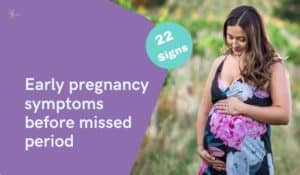Medically Reviewed by: Dr. Veena Shinde (M.D, D.G.O, PG – Assisted Reproductive Technology (ART) from Warick, UK) Mumbai, India
-
Author: Khushboo Kirale
- >> Post Created: July 16, 2021
- >> Last Updated: May 2, 2024

When does morning sickness end & few FAQs - Table of Contents
While pregnancy is one of the happiest time of a woman’s life; for some women the initial phase is full of trials. When I say trials trust me these are no less than the trials of Olympus.
The hormonal changes that are happening within a woman’s body to sustain a pregnancy can sometimes worsen one of the most common symptoms/signs of pregnancy—Morning Sickness, and for some women it may lead to hyperemesis gravidarum (HG).
All the pregnant women have the same questions about morning sickness—When does morning sickness start? How to prevent it? And most importantly When does morning sickness end?
In this article, we have not only addressed some of the most commonly asked question by pregnant women—like When does morning sickness end?—but we have also answered some of the other FAQs that will help you prepare. We have also added details about some of the tests that your doctor may prescribe to determine the severity of morning sickness.
When does morning sickness end?
To be fare, pregnant women are hassled in both the cases – When they do not get morning sickness and even when they get morning sickness. Many moms have asked us these common questions as well – When does morning sickness start?, When does morning sickness end? About its severity, treatments and so on…
To answer the most asked question by pregnant women – When does morning sickness end? – we would say – Typically, morning sickness/nausea usually peaks between weeks 8–11 of pregnancy and fades by the end of the 1st trimester.
Hallelujah for those moms whose morning sickness ends at the end of 1st trimester!!!
For several other expecting moms, nausea begins to increase around 12–14 weeks of pregnancy (so around the start of the second trimester). Almost all mothers report that their symptoms are completely gone by 16–20 weeks of pregnancy, although up to 10% of women actually suffer with severe nausea and dizziness all the way till their delivery.
Some pregnant women can experience it well into their second and even 3rd trimester. If your morning sickness – nausea & vomiting lasts beyond your first trimester, you may become more sensitive to the nauseating effects resulting due to the hormonal changes during pregnancy.
But it never hurts to mention your morning sickness – nausea to your doctor.
Occasionally, nausea may resurface within the third trimester because the baby gets bigger and squishes your stomach and intestines (which affects healthy digestion).
When is hyperemesis gravidarum (HG) diagnosed and what are the signs of dehydration?
If you have lost about 5% of the pre-pregnancy weight and experiences issues related with loss of bodily fluids, dehydration etc., then you might be suffering from HG. Sometimes HG can be treated at home easily with some lifestyle alterations, but other times you would need doctors help.
Severe morning sickness/severe nausea and vomiting causes fluid loss. The excessive loss of these essential bodily fluids can lead to dehydration which is definitely not healthy when pregnant. Call your doctor if you observe any of the following signs and symptoms of dehydration:
- You are unable to urinate.
- You pee very little and the color is dark.
- You are unable to keep down liquids.
- You get dizzy or even faint when you stand up.
- You have a really fast heart beat—racing or even pounding.
- Abnormally low blood pressure.
Women with HG need assistance and treatment from a doctor—sometimes in a hospital, especially to restore the bodily fluids lost due to vomiting.
Read this next
Tests that help determine the severity of morning sickness/nausea
When you go to your doctor, he may ask you about your medical history and of course your morning sickness/HG symptoms. Most of the times a standard physical exam is enough to diagnose HG. Your doctor will look for common signs of HG, such as a fast pulse or abnormally low blood.
In some cases, to mainly be on a safer side, blood and urine samples may also be necessary to check for signs of dehydration. Your doctor may order additional tests to rule out gastrointestinal problems as well.
An ultrasound might also be a good idea to rule out the possibility of being pregnant with twins/multiples or any other problems if present.
These are some common tests prescribed to determine the severity of HG and pick signs of dehydration:
- Complete blood count/blood chemistry
- Electrolytes—comprehensive metabolic panel (Chem – 20)
- Urine ketones
- Weight loss
These tests will determine whether you’re:
- Dehydrated
- Malnourished, or deficient in certain vitamins
- Anemic
Ultrasound test: An ultra sound helps determine if your baby is progressing well in your womb.
Your healthcare provider/doctor may also run a few more tests to make sure that you do not have any liver or gastrointestinal problems.
Common FAQs
There are some common doubts and fears in the minds of all expecting mothers who are suffering from morning sickness/nausea during pregnancy. We have addressed some of these common inquiries to assist you to tackle the condition better.
Is morning sickness associated with lower miscarriage risk?/ Can nausea cause a miscarriage?
Morning sickness occurs in almost 80 percent of all pregnancies, with nausea and vomiting starting around 6 weeks.
However, it is also true that women who have miscarriages are less likely to suffer from nausea. Basically, if your baby or your placenta wasn’t developing properly, it can mean that you will have lower levels of pregnancy hormones in your system. Hence, you will not be affected by nausea and vomiting.
A 2016 study by the National Institute of Health showed that women who experience nausea may be less likely to experience a miscarriage. This study confirms that there is an association between nausea/vomiting and a lower risk of miscarriage.
Don’t be worried if you don’t experience nausea or vomiting. Around 20% of women who do not suffer from morning sickness or may have very mild morning sickness throughout their pregnancy, have had a healthy pregnancy. Consider yourself one of the lucky few and stop worrying about not suffering! I have been among these lucky women who never got any kind of morning sickness. Triumphed 2 pregnancies – one being triplets.
But if you develop HG, severe vomiting can cause dehydration and decrease urination. And if you’re unable to replenish your fluid levels, you may have to get hospitalized and receive intravenous (IV) fluids.
This condition can also damage your liver, cause a B-vitamin deficiency, and result in poor growth weight in your developing child. Hence, it is very important to discuss your options with your doctor.
During pregnancy, foodborne illnesses are obviously a matter of concern and cannot be taken lightly. These illnesses include listeria and salmonella poisoning, which can cause premature delivery or even lead to a miscarriage.
When can nausea and vomiting of pregnancy become a problem?
Nausea and vomiting can become an issue if you cannot keep down food or fluids, as a result you start losing weight during pregnancy. If HG reaches this level of severity, then it can sometimes affect the fetus’ growth in your womb and also their weight at birth.
Will nausea/morning sickness harm my baby?
Thankfully, vomiting/nausea does not directly harm your baby in any way. Although you’re unable to realize any weight gain during the first trimester, it’s not generally a priority so long as you are able to achieve your daily food/ nutritional intake. You can definitely take some prenatal vitamin supplements, as per your doctor’s advice.
However, please note that severe and prolonged vomiting/HG has been linked to a greater risk of pre-term labor and birth, resulting in your child not only being born with a lower birth weight, but it can also result in lower fetal development. If you’re experiencing severe symptoms of morning sickness/HG, which you are unable to get under control, then it’s best to consult a doctor.
Morning sickness and other pregnancy related health concerns might cause temporary unease. However, all mothers soon learn the coping mechanisms that help in taking care of themselves and their baby for a successful pregnancy. Don’t let the pains of constant nausea, vomiting, and resultant tiredness affect your regular life.
Is nausea/morning sickness dangerous?
Morning sickness can be very uncomfortable (maybe even miserable) and disruptive for your lifestyle, but the positive news is that nausea is rarely harmful to you or your baby.
A 2016 study from the National Institute of Health showed that women who experience nausea may be less likely to experience a miscarriage. Nausea may indicate a healthy placenta that’s producing many pregnancy-supporting hormones.
A very small percentage of women have an extreme sort of nausea called hyperemesis. This condition causes severe, uncontrollable nausea and vomiting which will end in weight loss, electrolyte imbalances, malnutrition, and dehydration. It is often harmful to you and your baby if left untreated. If you are throwing up a lot more than you expected to, unable to eat or drink, suffering from a fever, losing 2 pounds in a week, or having dark-colored urine, it’s important to call your doctor. They will check the health of your baby and also help you control your vomiting so that you stay hydrated, nourished, and healthy.
Is it bad if you don’t get morning sickness?
If you’re one among the lucky 20% of women who don’t experience morning sickness/nausea during pregnancy, you may be feeling nervous. When people ask, “How are you feeling?” and you guiltily reply, “Totally fine!”—only to get strange looks and listen to stories of how they threw up for months. You may be worrying about your lack of nausea/vomiting, but understand that many women have completely healthy pregnancies without feeling a least bit sick.
Some women are more sensitive to hormonal changes or have more sensitive stomachs, which can make them more susceptible to nausea than others. It’s also common to suffer from nausea that comes and goes—some days you may feel yuck and other days you may feel just fine.
If you are worried about not getting any morning sickness or if it suddenly stops, contact your OB-GYN. They will be happy to assist and reassure you by checking your baby’s health to ensure everything is okay.
Is my morning sickness/ nausea unusual?
Don’t be fooled by the name morning sickness, because morning sickness/nausea can strike at any time and last all day. The concept of morning sickness at night has become more common now a days in women due to the changes in lifestyles. So having nausea at night is not unusual.
Around 70–80% of women experience morning sickness—nausea & vomiting during the first trimester, and no two women have the same experiences. Every woman has a different story to tell.
Some women who had severe morning sickness in their first pregnancy may not have nausea in the least bit in their second, or vice-versa.
It’s natural to wonder whether your nausea/vomiting leading to loss of appetite might be harmful for the baby. If you eat at regular intervals in spite of morning sickness and stay hydrated, the baby will still get all the needed nutrients and you may be able to overcome morning sickness through simple lifestyle changes. In rare and severe cases of nausea, your doctor will monitor you to make sure that you and your baby are getting the required nutrition and hydration to remain healthy.
Can nausea/vomiting during pregnancy be signs of other problems in your body?
Yes, certain medical conditions are known to cause nausea and vomiting during pregnancy. These conditions may include:
- Food-related illness
- Ulcer
- Thyroid
- Gallbladder disease
- Allergies
If your doctor suspects that you are portraying any of the symptoms related to the above conditions then your doctor may prescribe different medicines and tests for you. These are some of the signs that your doctor can observe to diagnose your nausea and vomiting being related to conditions other than morning sickness due to pregnancy.
- If your nausea and vomiting occurs for the 1st time after 9 weeks of pregnancy
- Tenderness and abdominal pains
- Fever
- Enlarged thyroid gland (swelling in the front of the neck)
- Headaches
Will I need medical attention if my nausea and vomiting are severe?
As mentioned earlier, if your morning sickness is too severe or if you have hyperemesis gravidarum (HG), then your doctor might admit you into the hospital until your symptoms are under control.
Many moms-to-be have this question, what kind of care would I get in the hospital?
The answer is you will be observed very closely and will be given nutrients via IV and certain diets which are known to get HG under control.
Here is something you can expect your hospital care would include:
- Regular lab tests may be done to check how your liver is working optimally
- You may receive fluids and vitamins through an intravenous (IV) line, if you are diagnosed with dehydration
- Additional medication may be prescribed to get excessive vomiting under control
- You may be put on a feeding tube to ensure your body and baby gets the required nutrition—only in the case if you continue to lose weight.
Key takeaway
Morning sickness is generally dreaded by most pregnant women. Some women don’t experience it at all, whereas a few others can suffer from a severe case of morning sickness, commonly called as hyperemesis gravidarum (HG).
If it is severe in your case and has been severe for more than 14–16 weeks, or even if you are unable to retain any food and keep throwing up, losing weight and your fetus is not gaining weight, then please contact your doctor immediately.
If you have been going through severe morning sickness and are just done with it, then the only thing going through your mind is—‘When does morning sickness end?’ Hope this article has helped in answering this crucial question.
Happy Pregnancy!!!







Nicely written and very informative.
Keep-up the good work.